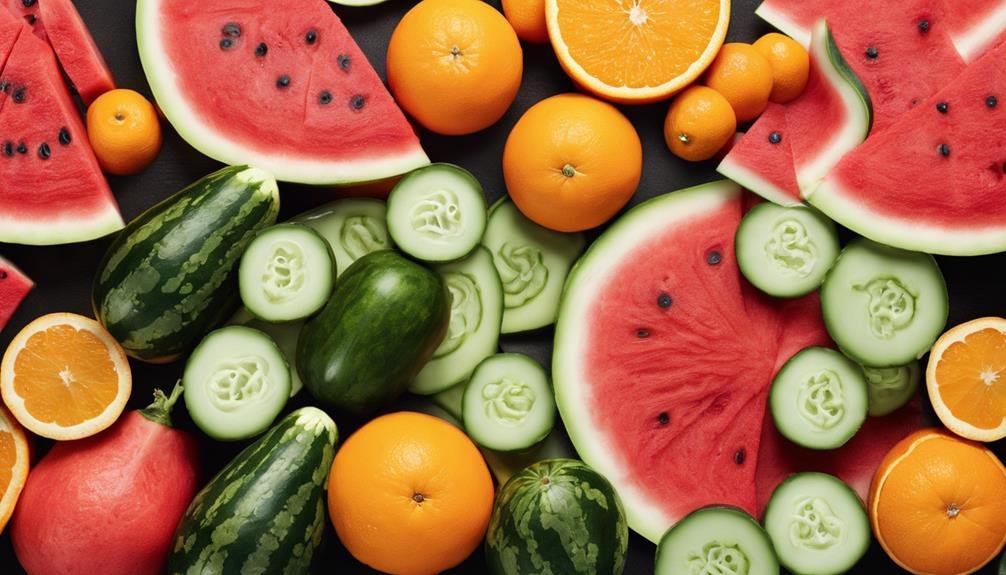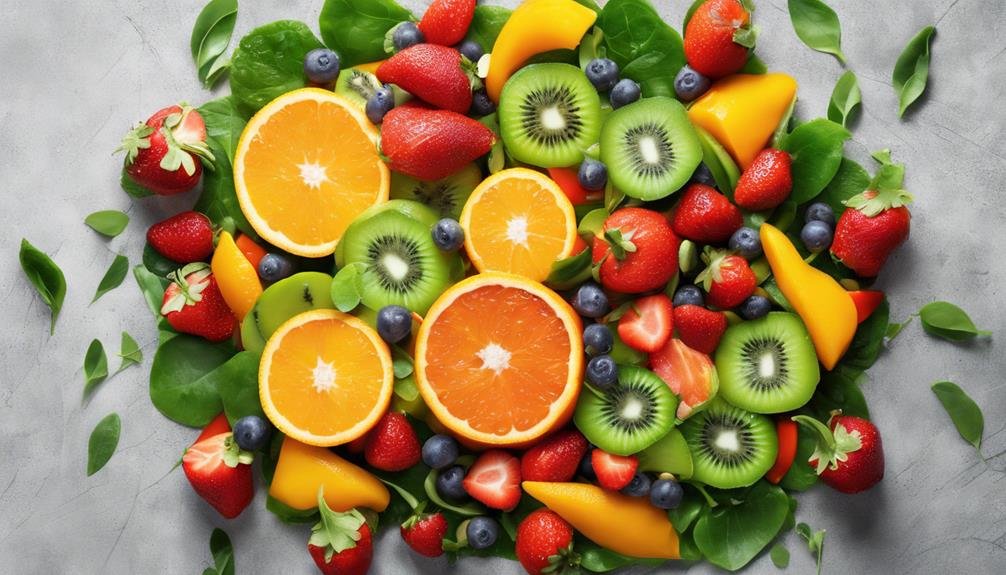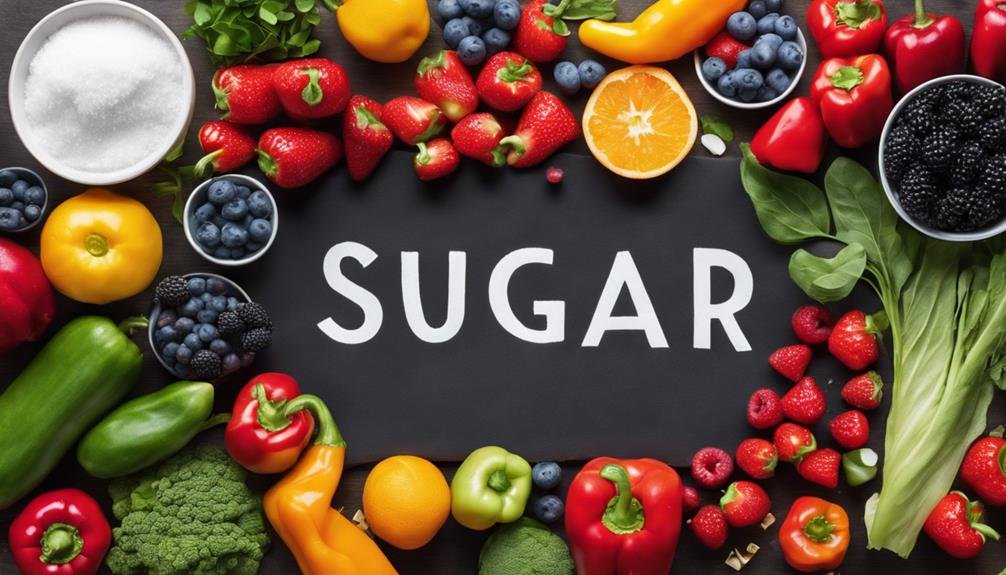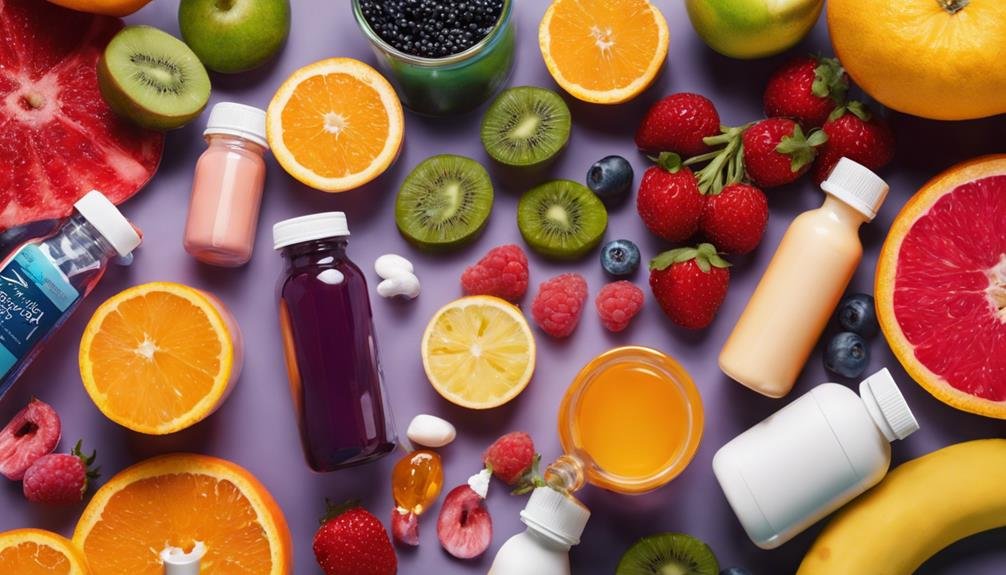To naturally boost collagen levels in your body, consider incorporating specific dietary choices and lifestyle habits that can support healthy skin and overall well-being. By focusing on nutrient-dense foods rich in essential vitamins and amino acids, you can lay a strong foundation for collagen production. But that's just the beginning; other factors like hydration, antioxidants, exercise, sun protection, and stress management play crucial roles in maintaining collagen levels and achieving a radiant complexion. Ready to explore the key strategies for enhancing collagen naturally and promoting skin health from within?
Key Takeaways
- Consume collagen-boosting foods rich in antioxidants and vitamins.
- Stay hydrated to support collagen production and skin health.
- Incorporate vitamin C-rich foods for collagen synthesis.
- Engage in regular exercise to promote collagen production.
- Protect skin from UV rays to prevent collagen breakdown.
Importance of Collagen
Collagen, a vital protein in your body, plays a crucial role in maintaining the structure and integrity of your skin, joints, and bones. This protein acts as a building block, providing strength and elasticity to these essential parts of your body.
As you age, collagen production naturally decreases, leading to common signs of aging such as wrinkles, joint pain, and decreased bone density.
In your skin, collagen is responsible for its firmness and youthful appearance. Without an adequate amount of collagen, your skin may lose its elasticity, leading to sagging and wrinkles.
Furthermore, collagen is crucial for joint health as it helps maintain the integrity of cartilage, which cushions your joints and prevents friction.
In your bones, collagen works alongside minerals like calcium to provide structure and strength.
Ensuring you have sufficient collagen through your diet or supplements can support the health of your skin, joints, and bones, promoting overall well-being and vitality.
Nutrient-Rich Diet
To support collagen production naturally, maintaining a nutrient-rich diet is key. Including specific nutrients in your daily meals can help boost collagen synthesis in your body.
Vitamin C plays a crucial role in collagen formation by aiding in the hydroxylation of proline and lysine, essential amino acids for collagen structure. Foods rich in vitamin C such as citrus fruits, strawberries, and bell peppers should be staples in your diet. Additionally, incorporating foods high in proline and lysine like eggs, dairy, and lean meat can provide the building blocks necessary for collagen production.
Omega-3 fatty acids found in fatty fish like salmon and mackerel can also support collagen production by reducing inflammation and protecting collagen from degradation. Antioxidants like vitamin E, present in nuts, seeds, and spinach, help combat oxidative stress, which can harm collagen. Including a variety of colorful fruits and vegetables in your meals ensures a spectrum of antioxidants to support collagen health.
Hydration Is Key
Staying hydrated is essential for maintaining healthy skin and supporting collagen production. Hydration plays a vital role in skin elasticity, firmness, and overall health. Dehydration can lead to dry, dull skin that is more prone to wrinkles and fine lines. To ensure your skin stays hydrated and collagen production is optimized, make sure to drink an adequate amount of water daily.
Importance of Hydration
| Hydration Benefits | Details | Tips to Stay Hydrated |
|---|---|---|
| Boosts skin elasticity | Hydrated skin appears plumper and firmer | Carry a reusable water bottle with you throughout the day |
| Supports collagen production | Collagen synthesis relies on adequate water intake | Set reminders to drink water at regular intervals |
| Flushes out toxins | Water helps rid the body of waste and toxins | Infuse water with fruits for added flavor |
| Improves skin texture | Hydration contributes to smooth, soft skin | Opt for herbal teas or coconut water for hydration variety |
Antioxidant-Rich Foods
For optimal skin health and collagen support, incorporating antioxidant-rich foods into your diet is paramount. Antioxidants are essential for protecting your skin from damage caused by free radicals, which can lead to collagen breakdown and premature aging.
Berries, such as blueberries, strawberries, and raspberries, are excellent sources of antioxidants like vitamin C, which can help boost collagen production. Additionally, dark leafy greens like spinach and kale provide antioxidants such as vitamin E and beta-carotene, which support skin health and collagen synthesis.
Including foods like nuts, seeds, and avocados in your diet can also provide a good dose of antioxidants like vitamin E and selenium, which help combat oxidative stress and promote collagen formation. Moreover, incorporating green tea and dark chocolate into your daily routine can further enhance your antioxidant intake, contributing to overall skin health and collagen support.
Incorporate Vitamin C
When looking to boost collagen naturally, one key nutrient to incorporate into your diet is vitamin C. Vitamin C plays a crucial role in collagen synthesis, the process that helps maintain the skin's firmness and elasticity. This powerful antioxidant protects the skin from oxidative stress caused by free radicals, which can break down collagen and lead to premature aging.
Including vitamin C-rich foods in your diet, such as citrus fruits, bell peppers, strawberries, and kiwi, can help support collagen production. Additionally, topical application of vitamin C serums may also benefit the skin by promoting collagen formation and reducing the appearance of wrinkles.
To ensure you're getting enough vitamin C for collagen production, aim to include a variety of sources in your daily meals. Remember that vitamin C is water-soluble, so it's important to consume it regularly to maintain optimal levels in the body. By incorporating vitamin C into your diet and skincare routine, you can support collagen production and keep your skin looking healthy and youthful.
Omega-3 Fatty Acids
To support collagen production and maintain skin health, incorporating Omega-3 fatty acids into your diet is essential. Omega-3 fatty acids are known for their anti-inflammatory properties, which can help reduce skin redness, inflammation, and improve overall skin appearance. These healthy fats play a crucial role in maintaining the skin's natural oil barrier, keeping it hydrated and supple.
Adding sources of Omega-3 fatty acids such as fatty fish (salmon, mackerel, sardines), walnuts, flaxseeds, and chia seeds to your meals can provide your body with the building blocks it needs to support collagen synthesis. Additionally, Omega-3 fatty acids have been shown to protect the skin from sun damage and help prevent premature aging.
Including Omega-3-rich foods in your diet not only benefits your skin but also supports your overall health. Aim to incorporate these foods regularly to enhance collagen production and keep your skin glowing and healthy.
Limit Sugar Intake
Excessive sugar consumption can have detrimental effects on collagen production and skin health. When sugar is consumed in high amounts, it can lead to a process called glycation.
Glycation occurs when sugar molecules bind to collagen fibers, causing them to become stiff and less elastic. This results in the formation of advanced glycation end products (AGEs), which can damage collagen and elastin in the skin, leading to wrinkles and sagging.
To boost collagen naturally, it's essential to limit your intake of added sugars found in sweets, sugary beverages, processed foods, and desserts. Instead, focus on consuming whole foods like fruits, vegetables, lean proteins, and whole grains. These choices not only provide essential nutrients for collagen synthesis but also help maintain stable blood sugar levels, which can prevent glycation and preserve collagen integrity.
Get Adequate Sleep
Limiting sugar intake is a key step in promoting collagen production and maintaining skin health.
Another crucial aspect of collagen production is getting adequate sleep. During deep sleep, the body goes into repair mode, producing collagen to help repair and rejuvenate the skin. Lack of sleep can lead to increased cortisol levels, which can break down collagen and result in premature aging of the skin.
To ensure you're getting enough rest for collagen production, aim for 7-9 hours of quality sleep each night. Establish a relaxing bedtime routine, avoid caffeine and electronics before bed, and create a comfortable sleep environment. Incorporating these habits into your nightly routine can help support collagen synthesis and overall skin health.
Regular Exercise Routine
Engaging in a regular exercise routine plays a significant role in supporting collagen production and maintaining skin health. Exercise increases blood flow, delivering essential nutrients and oxygen to the skin cells, which is crucial for collagen synthesis. Additionally, physical activity helps reduce stress levels, which can otherwise lead to collagen degradation and premature aging.
Studies have shown that moderate exercise can improve skin elasticity and firmness, contributing to a more youthful appearance. Activities like jogging, cycling, or yoga can promote collagen production by stimulating fibroblasts, the cells responsible for producing collagen.
Furthermore, exercise promotes overall health, which is essential for maintaining vibrant skin. Sweating during physical activity helps to flush out toxins from the skin, promoting a clearer complexion.
To harness the benefits of exercise for collagen production, aim for at least 150 minutes of moderate-intensity exercise per week. Remember, consistency is key when it comes to reaping the skin-enhancing rewards of a regular exercise routine.
Sun Protection Strategies
To maintain the health and integrity of your skin, it's imperative to implement effective sun protection strategies. The sun's ultraviolet (UV) rays can damage collagen fibers in the skin, leading to premature aging and a decrease in skin elasticity. To shield your skin from these harmful effects, make sure to apply a broad-spectrum sunscreen with an SPF of at least 30 daily, even on cloudy days. Reapply sunscreen every two hours, especially if you're sweating or swimming.
In addition to sunscreen, seek shade during peak sun hours, typically between 10 a.m. and 4 p.m., when the sun's rays are strongest. Wearing protective clothing, such as hats and sunglasses, can also offer extra defense against UV damage.
Remember that UV rays can penetrate through windows, so it's essential to protect your skin even when indoors or driving in your car.
Skin-Friendly Supplements
To support your skin's health and promote collagen production, incorporating skin-friendly supplements into your daily routine can be beneficial. Certain supplements contain essential nutrients that play a key role in maintaining skin elasticity and overall health. Here are some skin-friendly supplements you may consider adding to your regimen:
| Supplement | Benefits | Dosage |
|---|---|---|
| Vitamin C | Boosts collagen synthesis | 500-1000mg daily |
| Collagen Peptides | Supports skin elasticity and hydration | 10g daily |
| Omega-3 Fatty Acids | Reduces inflammation and hydrates skin | 1000mg daily |
| Zinc | Aids in wound healing and skin repair | 15-30mg daily |
These supplements, when combined with a healthy diet and proper skincare routine, can help improve your skin's appearance and promote collagen production naturally. Always consult with a healthcare provider before starting any new supplement regimen to ensure they are suitable for you.
Stress Management Techniques
Amid the hustle and bustle of daily life, finding effective stress management techniques is crucial for maintaining your overall well-being. Stress can significantly impact collagen production, leading to skin aging. Here are some evidence-based techniques to help you manage stress and support collagen production:
- Practice Mindfulness: Engage in activities like meditation or deep breathing exercises to reduce stress levels and promote collagen synthesis.
- Regular Exercise: Physical activity not only reduces stress but also boosts circulation, delivering essential nutrients for collagen production.
- Quality Sleep: Prioritize a good night's rest to allow your body to repair and regenerate collagen while keeping stress levels in check.
- Healthy Diet: Consuming collagen-boosting foods rich in antioxidants, vitamins, and minerals can help combat stress and support skin health.
Frequently Asked Questions
Can Collagen Supplements Replace Natural Collagen Production?
Yes, collagen supplements can support natural collagen production but not entirely replace it. Your body's ability to make collagen naturally is influenced by various factors like diet and lifestyle. Supplements can complement but not substitute for natural production.
How Long Does It Take to See Results From Collagen-Boosting Practices?
Results from collagen-boosting practices vary. Typically, noticeable improvements may appear within 4-8 weeks of consistent practice. However, individual factors like age, diet, and lifestyle play a role. Stay patient and diligent with your routine for optimal outcomes.
Are There Any Specific Foods That Can Degrade Collagen?
You can protect collagen by avoiding excessive sugar and refined carbohydrates, which can degrade it through a process called glycation. Opt for a balanced diet rich in antioxidants, vitamins, and minerals to support collagen production and skin health.
Can Collagen Levels Be Tested to Determine Effectiveness?
Yes, collagen levels can be tested through blood tests or skin biopsies to determine effectiveness. These methods provide valuable insight into your collagen status, helping tailor any interventions needed to support and maintain collagen levels.
Is It Possible to Consume Too Much Collagen for Optimal Results?
You can consume too much collagen for optimal results. Excessive intake may lead to digestive issues or interactions with certain medications. It's important to follow recommended dosages and consult a healthcare provider for personalized advice.
Conclusion
In conclusion, boosting collagen naturally requires a commitment to a nutrient-rich diet, proper hydration, antioxidant-rich foods, vitamin C incorporation, regular exercise, sun protection, skin-friendly supplements, and stress management. Remember, consistency is key to cultivating collagen for youthful, radiant skin. So, stay steadfast in your efforts to nourish your body with collagen-boosting goodness for a glowing, gorgeous complexion.







